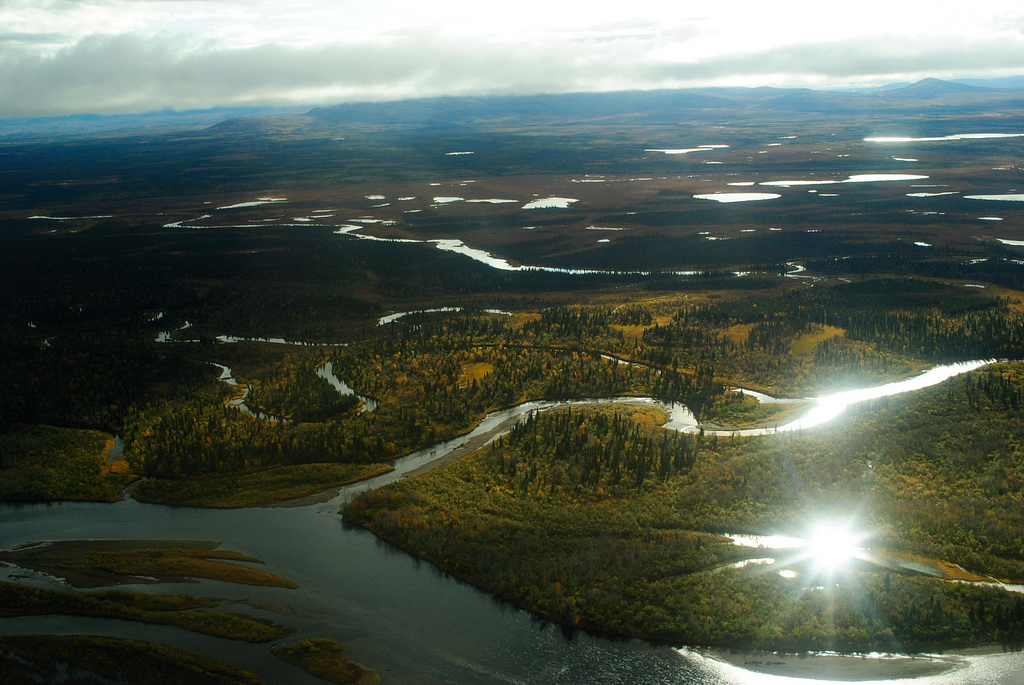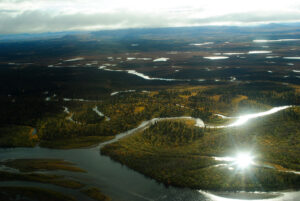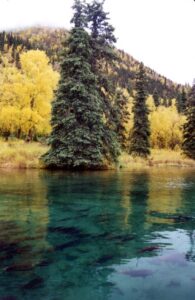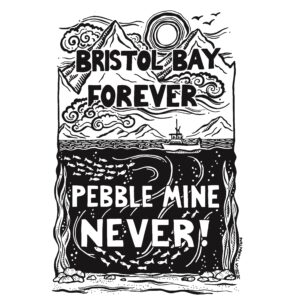
Pulling the Pebble mine out of Alaska’s XTRATUFs
in Bristol Bay, Clean Air and Water, Litigation, Marine Ecosystems, Social justice, Wild Lands & Wildlife
By Dawnell Smith
A pebble underfoot can make walking unpleasant and irritating, and turn the things you do and love into more irksome and unpleasant experiences than they should be. The proposed Pebble mine feels like that pebble in Alaska’s collective neoprene boot right now.

Mulchatna River at the heart of the Nushagak watershed in Bristol Bay. Photo courtesy of USEPA.
It’s true that it once felt like a massive boulder field hanging over Bristol Bay’s future, but that changed in January 2023 when the U.S. Environmental Protection Agency prohibited large-scale mining projects like Pebble in the Bristol Bay watershed.
Pebble may feel more like an annoying stone in Alaska’s XTRATUF than a dangerous overhang right now, but it still needs to be removed once and for all. Pebble has burdened Alaskans and Alaska communities long enough. Unfortunately, Pebble’s proponents have turned up in court again to push their mining agenda despite overwhelming opposition in Alaska.
Pebble Limited Partnership (a subsidiary of Northern Dynasty of Canada) went to court challenging EPA’s prohibition on large scale mining in March 2024. The State of Alaska soon followed.
We responded by going to court again in May, joining Tribes, Bristol Bay groups, and other organizations in defending EPA’s authority in keeping mines like Pebble out of one of the world’s last thriving watersheds for fishlike salmon and an array of human and more-than-human communities.

Spawned out reds, photo by Kristina Ramstad
Astounding abundance
Our goal in going to court always centers on protecting salmon and clean water. We join our clients and partners in advocating for the protection of Bristol Bay from massive open pit mines that would devastate the land and churn out deadly toxins into waterways. These landscapes have been vital to local people for millennia, and to the region’s astounding abundance of life.
Trustees intervened on behalf of 12 groups to defend EPA’s protections of Bristol Bay. Our joint motion to intervene included our 12 clients, plus three clients represented by EarthJustice and the Natural Resources Council representing itself.
Tribes and Bristol Bay groups intervened in a separate filing, noting in their press release, “The EPA’s Clean Water Act protections for Bristol Bay span two decades of research, scientific studies, and public engagement processes, making the Pebble Mine proposal the most studied mining proposal in American history. This decision also reflects the will of the overwhelming majority of Bristol Bay residents and Alaskans.”
The region’s salmon sustain local people and thriving fish runs that supply more than 50 percent of the world’s wild sockeye salmon and employ tens of thousands of people in commercial fishing, sport fishing, outdoor recreation, and tourism.
Clean, cold, clear water

Design by Jessica Thornton
One of our clients put the need for the enduring protection of Bristol Bay in the clearest terms. “As a fourth generation Yup’ik, Unangan, Iñupiaq and Sugpiaq commercial fisherman with a deep family history in Bristol Bay, the proposed Pebble mine threatens to impact not only my economic security, but my family’s health, home, and ability to consume traditional foods,” said Melanie Brown, outreach director for SalmonState. “Bristol Bay needs clean, cold, clear water — not contamination from a massive, open-pit, acid-generating mine.”
For decades now, we have joined clients and partners in advocating and litigating to keep Bristol Bay’s streams, rivers, and waterways free of industrial toxins and the devastation caused by large-scale open pit mines. The waste produced by Pebble would decimate salmon runs, the livelihoods of thousands and thousands of people, and the ways of life of local people.
The EPA’s analysis of the project concluded as much and determined that the risks and consequences of mining are not acceptable. We agree, and so do Alaskans.
It’s a drag to have to stop what you’re doing—fishing, filleting fish, feeding your family and community, telling fish stories—to pull off your boots and get rid of that Pebble, but it has to be done. Bristol Bay needs and deserves a future without Pebble, whatever its shape or size.
xxx
Law firm Trustees for Alaska represents SalmonState, The Alaska Center, Alaska Community Action on Toxics, Alaska Wilderness League, Alaska Wildlife Alliance, Cook Inletkeeper, Friends of McNeil River, Kachemak Bay Conservation Society, National Parks Conservation Association, National Wildlife Federation, Sierra Club, and Wild Salmon Center.


